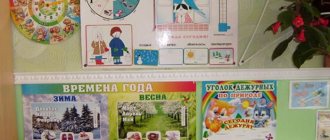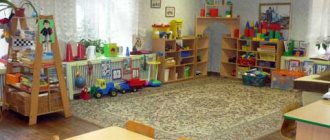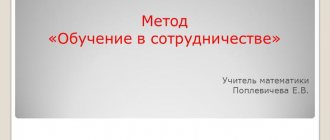Professional competence of a preschool teacher in the context of the implementation of the Federal State Educational Standard for preschool education
Professional competence of a preschool teacher
Good afternoon, dear colleagues!
In accordance with the new law “On Education in the Russian Federation,” preschool education for the first time became an independent level of general education. On the one hand, this is recognition of the importance of preschool education in the development of a child, on the other hand, it is an increase in requirements for preschool education, including through the adoption of the federal state educational standard for preschool education.
But no matter what reforms take place in the education system, they, one way or another, are limited to a specific performer - the kindergarten teacher. It is the practical teacher who implements the main innovations in education. To successfully introduce innovations into practice and effectively implement the assigned tasks in the conditions of the Federal State Educational Standard, a teacher is required to have a high level of professional pedagogical competence.
The professional and pedagogical competence of teachers is not a simple sum of subject knowledge, information from pedagogy and psychology, and the ability to conduct classes or events. It is acquired and manifested in specific psychological, pedagogical and communicative situations, in situations of real solving professional problems that constantly arise in the educational process.
What are the requirements for the personality of a modern teacher and his competence?
In the preschool education system, the process of interaction between teacher and child is a priority. Modern processes of modernization of preschool education highlight not the formal affiliation of the teacher to the profession, but the personal position he occupies, which ensures his attitude towards teaching work. It is this position that guides the teacher towards understanding the ways of interacting with the child.
Currently, what is in demand is not just a teacher, but a teacher-researcher, educational psychologist, and educational technologist. These qualities in a teacher can only develop in conditions of a creatively, problematically and technologically organized educational process in a preschool institution. Moreover, provided that the teacher is actively engaged in scientific-methodological, search, experimental, innovative work, learns to look for his “professional face”, his pedagogical tool.
Today, every teacher needs to acquire and develop competencies that make him a creatively active participant in interaction with children:
- Humane pedagogical position;
- Deep understanding of the tasks of preschool education;
- The need and ability to take care of the ecology of childhood, to preserve the physical and spiritual health of pupils;
- Attention to the individuality of each child;
- Willingness and ability to create and creatively enrich a subject-developmental and cultural-information educational environment;
- The ability to purposefully work with modern pedagogical technologies, the willingness to experiment and implement them;
- The ability for self-education and conscious self-development of the individual, willingness to learn throughout the entire working life.
Currently, the “Professional Standard of a Teacher” is being finalized, which was supposed to come into force on January 1, 2015. However, the All-Russian Trade Union of Education sent a letter to the Minister of Labor and Social Protection of the Russian Federation with a request to postpone the date of its introduction to January 1, 2020. According to the All-Russian Trade Union of Education, the hasty introduction of a professional standard may cause numerous legal conflicts, and therefore the official postponement of the start date of application of the professional standard of a teacher to a later date may become a justified, balanced and objective step on the part of the Russian Ministry of Labor.
So, in the professional standard in paragraph 4.5, the professional competencies of a preschool teacher (educator) are listed.
1. Know the specifics of preschool education and the features of organizing educational work with children.
2. Know the general patterns of child development in early and preschool childhood; features of the formation and development of children's activities in early and preschool age.
3. Be able to organize the main types of activities in preschool age: object-manipulative and playful, ensuring the development of children. Organize joint and independent activities of preschoolers.
4. Know the theory and pedagogical methods of physical, cognitive and personal development of children.
5. Be able to plan, implement and analyze educational work with children of early and preschool age in accordance with the Federal State Educational Standard for preschool education.
6. Be able to plan and adjust educational tasks (together with a psychologist and other specialists) based on monitoring results, taking into account the individual developmental characteristics of each child.
7. Implement pedagogical recommendations of specialists (psychologist, speech therapist, social teacher, defectologist, etc.) in working with children who have difficulties in mastering the program, or children with special educational needs.
8. Participate in creating a psychologically comfortable and safe educational environment, ensuring the safety of children’s lives, preserving and strengthening their health, supporting the emotional well-being of the child.
9. Be proficient in methods and means of analyzing psychological and pedagogical monitoring, which allows assessing the results of children’s mastery of educational programs, the degree of formation of the necessary integrative qualities of preschool children necessary for further education and development in primary school.
10. Know the methods and means of psychological and pedagogical education of parents (legal representatives) of children, be able to build partnerships with them to solve educational problems.
11. Possess ICT competencies necessary and sufficient for planning, implementing and evaluating educational work with children.
What is the Role of competency assessment in the professional development of teachers?
Today there is a serious discrepancy between the real and necessary level of professional competence of teachers.
How this shows up in practice:
- In the work of preschool educational institutions, the educational-disciplinary model still prevails, and teachers are not always able to build subject-subject relationships with children and their parents. In order for a child to become a subject of the educational process, he must meet a subject in the person of a teacher - this is the whole essence of pedagogical work;
- Many teachers, especially experienced ones with extensive work experience, are focused primarily on fulfilling job responsibilities. And today, educators who are able to independently plan and build an appropriate system of work are in greater demand.
- There are many teachers who, having once received a specialized education, limit themselves to attending advanced training courses. At the same time, the realities of today require professionals to engage in self-education throughout their lives. Therefore, one of the significant indicators of a teacher’s professional competence is his readiness for self-education and self-development, as well as the ability to creatively apply new knowledge and skills in practical activities. The effectiveness of his work directly depends on the teacher’s awareness of the need to constantly improve the level of professional qualifications.
Regular assessment of the professional competencies of preschool teachers will stimulate their desire for self-education and professional self-improvement (and teacher self-esteem).
Today, preschool teachers are required to be actively involved in innovative activities, in the process of introducing new programs and technologies for interaction with children and parents. In these conditions, a comprehensive and objective assessment of the professional competencies of preschool teachers acquires special importance.
Formation and development of professional competencies of a teacher
Based on modern requirements, we can determine the main ways to develop a teacher’s professional competencies:
— work in methodological associations, problem-solving and creative groups;
— research, experimental and design activities;
— innovative activity, development of new pedagogical technologies;
— various forms of psychological and pedagogical support, both for young teachers and for experienced teachers, mentoring;
— open screenings and mutual visits to classes;
- pedagogical rings - guides teachers to study the latest research in psychology and pedagogy, methodological literature, helps to identify different approaches to solving pedagogical problems, improves the skills of logical thinking and argumentation of their position, teaches conciseness, clarity, accuracy of statements, develops resourcefulness, and a sense of humor;
— active participation in professional competitions at various levels;
— generalization of one’s own teaching experience at city events and on the Internet;
— teachers’ work with scientific and methodological literature and didactic materials;
— organization of practical seminars, practical classes, general education;
— trainings: personal growth; with elements of reflection; development of creativity;
— psychological and pedagogical living rooms, business games, master classes, etc.
But none of the listed methods will be effective if the teacher himself does not realize the need to improve his own professional competence. To do this, it is necessary to create conditions in which the teacher realizes the need to improve the level of his professional qualities.
It should be noted that the formation and development of professional competence, increasing the level of skill of teachers is a priority area of activity not only for the administration of the preschool educational institution, but also for the socio-psychological service as a whole, since it occupies a special place in the management system of a preschool institution and represents an important link in the holistic system of improvement professionalism of teaching staff, since, first of all, it coordinates the work of preschool educational institutions in the implementation of the Federal State Educational Standard.
Thus, a modern kindergarten needs a teacher who will not be a “teacher”, but a senior partner for children, contributing to the development of the pupils’ personality; a teacher who is able to competently plan and build the educational process, focusing on the interests of the children themselves, but at the same time not be afraid to deviate from the planned plan and adapt to real situations; a teacher who can independently make decisions in a situation of choice, predicting their possible consequences, as well as capable of cooperation, possessing psychological and pedagogical knowledge, modern information and communication technologies, capable of self-education and introspection. The higher the level of professional competence of teachers, the higher the level of quality of education in preschool educational institutions, and a well-constructed system of interactive forms of work with teaching staff leads not only to the development of professional competence of teachers, but also unites the team.
Professional competencies of a teacher in accordance with the “Professional Standard of a Teacher”
Definition 1
The professional competence of a teacher is his readiness for teaching activities, the teacher’s personal attitude towards his profession and professional activities, the desire for a creative understanding of his own work and self-improvement.
Currently, the teaching profession is in great demand. This is explained by the fact that great demands are placed on the training of the younger generation both from society and from the state. In order for the pedagogical process to be effective, each teacher must have not only certain personal qualities, but also a number of professional competencies. These qualities of a teacher must be constantly developed and improved in the conditions of creative activity and the educational process.
In accordance with the “Professional Standard of a Teacher,” each preschool teacher must have the following professional competencies:
Finished works on a similar topic
- Course work Professional competence of a teacher in an educational organization in the context of the implementation of the Federal State Educational Standard 410 rub.
- Abstract Professional competence of a teacher in an educational organization in the context of the implementation of the Federal State Educational Standard 250 rub.
- Test work: Professional competence of a teacher in an educational organization in the context of the implementation of the Federal State Educational Standard 220 rub.
Receive completed work or specialist advice on your educational project Find out the cost
- Have knowledge in the field of specifics of preschool education and the features of organizing educational activities with preschool children.
- Have knowledge of the general patterns of development of a preschool child, the formation of children's activities.
- Possess skills in organizing leading types of activities for preschool children (play, object-manipulative, independent and joint), in order to ensure the full and comprehensive development of preschool children.
- Possess theoretical knowledge and modern pedagogical methods aimed at studying the level of physical, mental, mental, cognitive and personal development of preschool children.
- Be able to plan and implement educational activities with preschool children, analyze and reflect on the work done in accordance with the Federal State Educational Standard for Educational Education.
- Possess the skills to plan and adjust educational tasks, based on the results of monitoring and taking into account the age and individual characteristics and needs of each student.
- Be able to put into practice recommendations given by other specialists (psychologist, speech therapist, social teacher, defectologist, etc.).
- Take an active part in creating a favorable and comfortable psychological environment in the preschool group, as well as an effective educational environment that can provide students with safe conditions for their life and health, and support the emotional well-being of children.
- Possess the means and methods of analyzing psychological and pedagogical monitoring aimed at assessing the results of students’ mastery of the educational program, the level of formation of a number of integrative and personal qualities necessary for them to successfully study at school.
- Be fully proficient in the necessary methods and means of educational work with parents (guardians, legal representatives) of pupils. Possession of the skills to establish fruitful relationships with them, to solve educational problems and prevent possible conflicts.
- Possession of the skills and competencies of working with ICT necessary for organizing the modern educational process with preschool children.
Too lazy to read?
Ask a question to the experts and get an answer within 15 minutes!
Ask a Question




